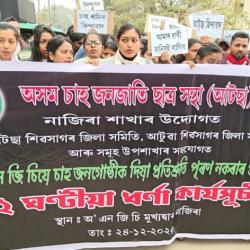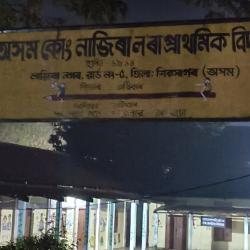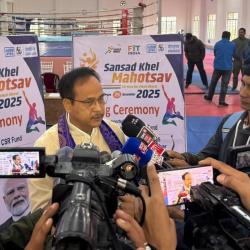Pictorial warnings on tobacco products in India from 30th November
All tobacco products will display approved pictorial warnings and nicotine-tar levels from 30 November 2008, as per a notification issued by the Indian Ministry of Health and Family Welfare (dated 27 August 2008), in accordance with the Cigarettes and Other Tobacco Products (Prohibition of advertisement and Regulation of Trade and Commerce, Production, Supply and Distribution) Act, 2003. The implementation of pictorial warnings on tobacco products in India was initially planned for February 2007, but got deferred four times thereon.
Grim images of diseased lungs will appear on cigarette, bidi and gutkha packets, as per the notification, covering 40 per cent of the surface area of the tobacco packets, with the message: 'Tobacco kills/Smoking kills'.
The warnings were finally approved by a Group of Ministers (GoM), including the Union External Affairs Minister - Pranab Mukherjee, the Union Information and Broadcasting Minister - PR Dasmunsi, the Minister of State for Labour and Employment - Oscar Fernandes the Union Minister for Commerce and Industry –Kamal Nath, Union Minister for Culture and Urban Development –Jaipal Reddy and Union Health and Family Welfare Minister Anbumani Ramadoss.
Now, the tobacco industry has been given three months time to put up the pictorial warnings
The GoM formed in 2007 by the Government of India was tasked to review the pictorial warnings on tobacco products. This GoM decided earlier this year (February 2008) to go for mild pictorial warnings on tobacco products. This GoM declined to accept the pictorial warnings (skull and bones) on tobacco products that surveys conducted in India had shown to work towards tobacco control, rather picked up weaker warnings. The GOM in an earlier meeting this year headed by India's External Affairs Minister Mr Pranab Mukherjee had agreed for two mild images of a scorpion signal depicting cancer or an x-ray plate of a man suffering from lung cancer as pictorial warning to deter people from smoking.
Not only this is in compliance with the Cigarettes and other Tobacco Products Act, 2003, but also with the provisions of the global tobacco treaty. On 5 February 2004, India had signed and ratified World's first corporate accountability and public health treaty – the World Health Organization (WHO) Framework Convention on Tobacco Control (FCTC). Article 11 of the FCTC states that warning messages should cover at least 50% of the principal display areas of the package (i.e. both the front and back), but at a minimum must cover at least 30% of the principal display areas. In India, these warnings will cover 40% of the principal display area of tobacco packets.
Several nations have implemented strong health warning label requirements. Examples include:
- Canada, whose health minister recently proposed enlarging the labels from 30% of the package face to 60%;
- Thailand, which has added the message "SMOKING CAUSES IMPOTENCE" to its list of required warnings; and
- Australia, which was the first nation to require that "how to quit" information be printed on every pack.
- South Africa, Singapore and Poland also require strong warning labels.
These pictorial warnings provide smokers with helpful information on the health effects. Most smokers want this information, and certainly want their children to have this information too. The tobacco industry is continuing its decades-long strategy of trying to minimize the effectiveness of package warnings. The tobacco industry is no friend of smokers - and ironically it's true that 'the tobacco industry kills its best customers'. The Indian Council of Medical Research (ICMR) says tobacco use causes 10 lakh deaths (a million) in India every year.
Also package warnings on tobacco products are a good public health strategy because the cost of package warnings is paid for by tobacco companies, not government. Also this should not be looked upon as an isolated initiative rather has to be supported by comprehensive healthcare, legislations and education programmes to attain long-run public health gains. Hopefully this time, these pictorial warnings will get enforced from November 30.
Other Contents by Author
The 'We reject Indo US Nuclear Deal' campaign was launched today in Lucknow by Dr Sandeep Pandey, Ramon Magsaysay Awardee (2002) and convener of National Alliance of People's Movements (NAPM). Dr Pandey was speaking on Indo US Nuclear Deal at Rao's IAS coaching centre on Faizabad road."The dream to provide electricity across the country by signing the Indo US Nuclear Deal is not true" said Dr Pandey. "Nuclear power is not a safe, affordable or better option for producing electricity. Rather nuclear power is a very dangerous and expensive option. The Indo US Nuclear Deal is actually a political and military deal" said Dr Pandey.There is a deliberate misinformation being...
Last week the bollywood heartthrob film-star Aamir Khan was found smoking after the launch of the latest blockbuster movie 'jaane tu … ya jaane na'. Earlier in June 2008, he was reported saying that he is back to smoking due to 'stress' related to the forthcoming release of 'jaane tu … ya jaane na' film and he will quit smoking right after the film-release. Although the film has been successfully released and is doing well at box office, the cigarettes are hard to leave… and Aamir continues to smoke. Tobacco is addictive, and some researchers feel nicotine is as addictive as heroin. It is not impossible to quit, but not easy too, because tobacco is so...
Despite of the India's legally-binding Cigarette and Other tobacco products Act (2003) and repeated appeals of India's Health and Family Welfare Minister Dr Anbumani Ramadoss to bollywood film-stars to refrain from on-screen smoking, there seems to be less compliance in the guise of 'creative liberty'.On 30 June 2008, the Goa Bench of Mumbai High Court issued notice to megastar 'Big B' - Amitabh Bachchan - and others for allegedly violating the Anti-Tobacco Act. Goa-based anti-tobacco organisation, National Organisation for Tobacco Eradication (NOTE), had filed the case against Bachchan and others after billboards showing the megastar smoking a cigar were raised on the Goa highway. Indian...
NAPM demands immediate closure of the Counter-Insurgency and Jungle Warfare School at Vairengte in Mizoram Amidst protests against price rises of essential items throughout the country, the Prime Minister Manmohan Singh has again started harping on the issue of the Indo-US Nuclear Deal. Activists of National Alliance of People's Movements (NAPM) - the largest network of people's struggles in India - opposed the deal. "The Deal has been pushed forward in India in an anti-democratic manner without approval of the Parliament - in fact in the teeth of opposition by a large majority of parliamentarians" said Dr Sandeep Pandey, who is a Ramon Magsaysay Awardee (2002) and a convener of...
A 10-days fast (16 - 25 June 2008) demanding the release of Dr Binayak Sen began today in India, Pakistan, Thailand, US and UK. More than 100 organizations have endorsed this fast and campaign demanding justice for Dr Sen worldwide.Twenty-two Nobel laureates from around the world had earlier appealed to the Indian government to allow Dr Binayak Sen to receive the 2008 Jonathan Mann Award for Global Health and Human Rights in person at the end of May 2008. But Indian government denied the permission and Dr Sen's wife received the coveted award on his behalf.Dr Binayak Sen of Raipur, Chhattisgarh, India, who has helped establish a hospital serving poor mine workers in the region, founded a...
This posting is based on The Times of India news published on 8 June 2008, to read the news, click here The ITC's license to purchase 500,000 metric tonnes of wheat directly from the farmers in Uttar Pradesh (UP) state was suspended till 30 June 2008 by UP state government. Despite of a UP government's cabinet order not to purchase wheat till 30 June 2008 during the 'Rabi' crop harvesting season, and another state government's order on 25 May 2008 which fixes stock limit for traders, ITC could manage to get a license issued from Agriculture department of UP government on 30 May 2008 to purchase 500,000 metric tonnes of wheat directly from the farmers. When the leading English newspaper...
On June 9, for the first-time government, public health and business leaders, heads of UN agencies and advocates are coming together at United Nations (UN) Headquarters to acknowledge HIV/TB as an urgent priority. This first HIV/TB Global Leaders' Forum, convened by Dr Jorge Sampaio, the UN Secretary-General's Special Envoy to Stop TB, seeks to galvanize leadership at all levels. The 2008 Anti-Tuberculosis Drug Resistance in the World report and the 2008 Global Tuberculosis Epidemic report of World Health Organization (WHO) clearly mandates much heightened urgency in responding to TB-HIV co-infection.India continues to have the highest TB burden in the world. TB is the leading cause of...
Land-mafia in Kanpur in connivance with officials of Kanpur Development Authority (KDA) have slapped false fabricated charges against an Right-to-Information (RTI) campaign leader - Roby Sharma.Roby has been spearheading the RTI campaign in Kanpur since past two years now, exposing corruption and championing people's causes across the city.Roby had filed a RTI application seeking the information from the KDA and Fire Department officials on how many multi-storey buildings are following the fire-safety norms setup by them, and how many of these buildings have obtained a no-objection certificate from the fire department.Roby had further asked under the RTI Act that under which government...
A human rights activist was arrested in Manipur for discussing a state government's decision in a public forum. Sapam Kangleipal Meitei, 27 years, was discussing the impact of arming the civilians with weapons on the conditions prevalent in Manipur state. The state government had decided to give 500 gun licenses to natives of two villages in Manipur state. State government decided to hand over 500 gun licenses to civilians because armed cadres of People Revolutionary Party of Kangleipak (PREPAK), an armed opposition group in Manipur, had reportedly shot-dead two girls and a boy while seriously injuring the eyes of another girl on 24 March 2008. So the civilians of these villages were...
More than 300 million people around the world have asthma, and the disease imposes a heavy burden on individuals, families, and societies.The Global Burden of Asthma Report, indicates that asthma control often falls short and there are many barriers to asthma control around the world. Proper long-term management of asthma will permit most patients to achieve good control of their disease. Yet in many regions around the world, this goal is often not met.Poor asthma control is also seen in the lifestyle limitations experienced by some people with asthma. For example, in some regions, up to one in four children with asthma is unable to attend school regularly because of poor asthma control....










Add new comment